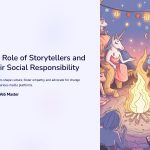 Storytellers have long held a central role in shaping human culture, history, and societal norms. From ancient mythologies passed down through generations to the modern digital age of movies, blogs, and social media, storytelling continues to be a powerful tool for influencing public opinion, fostering empathy, and advocating for change. With this power comes the responsibility to ensure that stories are not only compelling but also socially responsible. In this post, we will explore the vital role of storytellers and discuss their social responsibilities in the context of modern society.
Storytellers have long held a central role in shaping human culture, history, and societal norms. From ancient mythologies passed down through generations to the modern digital age of movies, blogs, and social media, storytelling continues to be a powerful tool for influencing public opinion, fostering empathy, and advocating for change. With this power comes the responsibility to ensure that stories are not only compelling but also socially responsible. In this post, we will explore the vital role of storytellers and discuss their social responsibilities in the context of modern society.
The emergence of new platforms for storytelling, such as social media, has amplified the reach of individuals who create content. As these platforms grow, so too does the influence of the people who contribute to them. Whether a storyteller is a journalist, an author, a filmmaker, or an influencer on social media, they all have the power to reach millions of people. This power, however, carries the weight of responsibility. A storyteller’s words and images can either contribute to positive change or perpetuate harmful stereotypes and misinformation.

Storytellers as Cultural Influencers
Storytellers play an integral role in shaping culture. Through books, movies, music, and other forms of media, they communicate shared values, beliefs, and ideas. Historically, storytelling has been a means to transmit knowledge, preserve traditions, and shape collective identity. In contemporary society, storytellers continue to hold this influential position, but they now have the ability to reach global audiences instantly.
One of the key aspects of storytelling in modern times is its ability to transcend geographical and cultural boundaries. The advent of the internet and digital platforms has allowed storytellers to connect with audiences around the world. As a result, their stories can foster greater understanding, build empathy, and highlight global issues that may have otherwise gone unnoticed.
However, the power of storytelling also means that it can be used to perpetuate harmful ideas or reinforce negative stereotypes. For example, certain media portrayals of marginalized communities can lead to the stigmatization and marginalization of these groups. In this way, storytellers must remain conscious of the impact their stories have on societal perceptions.

The Ethical Responsibility of Storytellers
Along with their power to influence comes the ethical responsibility of ensuring their stories do not harm or mislead their audience. Storytellers must be mindful of the messages they communicate, as their narratives can shape people’s attitudes, beliefs, and behaviors. A responsible storyteller should prioritize accuracy, fairness, and respect for all individuals and communities.
This responsibility extends beyond just avoiding harmful stereotypes. Storytellers must also consider the consequences of promoting false narratives, which can contribute to the spread of misinformation and propaganda. In an age where misinformation can spread rapidly through social media, storytellers must be particularly vigilant in ensuring their stories are truthful and grounded in reality.
Moreover, storytellers should aim to use their platforms for positive change. By telling stories that highlight important social issues, they can raise awareness about injustice, inequality, and other pressing concerns. The stories they share can inspire action, spark conversations, and motivate others to make a difference in the world.

Storytellers and the Impact on Social Movements
In the context of social movements, storytellers have historically played a critical role in mobilizing people and bringing attention to causes that may have been overlooked by the mainstream. From the civil rights movement to contemporary advocacy for climate change, storytellers have been instrumental in shaping the narratives around these important issues.
By giving voice to the marginalized and oppressed, storytellers can help bring about social change. They can expose the injustices faced by certain communities and provide a platform for those who may not have had the opportunity to share their stories otherwise. In doing so, storytellers can challenge the status quo and advocate for policies and practices that promote equality and justice.
Furthermore, in today’s world, where social media platforms provide a direct line to a vast audience, storytellers can quickly mobilize support for a cause. Whether it’s through a viral hashtag or an impactful video, the ability to spread important messages has never been easier. As such, storytellers have a responsibility to use their influence to uplift causes that align with ethical values and promote social good.

The Role of Storytellers in Promoting Empathy and Understanding
One of the most significant benefits of storytelling is its ability to foster empathy. Through stories, we gain insight into the lives and experiences of others, which can help bridge the gap between different cultures, backgrounds, and perspectives. Storytellers have the ability to humanize complex issues, allowing audiences to see the world through the eyes of someone else.
In times of social division, storytelling can serve as a tool for healing and reconciliation. It allows individuals to understand the struggles of others, creating common ground where none existed before. A well-told story can change hearts and minds, promoting understanding and compassion in a way that statistics or speeches often cannot.
Storytellers who focus on promoting empathy have the power to create more inclusive and compassionate societies. By telling stories that encourage listeners or viewers to step into someone else’s shoes, storytellers can break down prejudices, foster connections, and encourage cooperation between people from different walks of life.

The Responsibility of Social Media Storytellers
In today’s digital age, the role of the storyteller has expanded beyond traditional media. Social media platforms allow individuals to create and share content with a global audience, turning almost anyone into a potential storyteller. While this democratization of storytelling is empowering, it also presents unique challenges.
On social media, stories can spread quickly, and misinformation can be just as viral as factual content. Social media storytellers, therefore, have a heightened responsibility to ensure that their posts do not contribute to the spread of false or harmful information. Moreover, the anonymity of the internet can sometimes lead to a lack of accountability, which can result in toxic behavior, harassment, or the sharing of harmful content.
To uphold their social responsibility, social media storytellers must adhere to ethical standards, fact-check their content, and strive to create a positive impact. They should use their platforms not just for personal gain, but to contribute to the greater good, raising awareness about important issues and fostering constructive conversations.

Conclusion: Storytellers as Ethical Leaders
Storytellers, in all their forms, are not just entertainers or creators—they are ethical leaders who shape the way we perceive the world. With their influence, they have the power to build or dismantle social norms, challenge societal structures, and inspire meaningful change. As such, storytellers must recognize their social responsibility and approach their craft with integrity, mindfulness, and a commitment to positive impact.
Storytelling is a potent tool for good, but it can also have negative consequences if misused. By embracing their social responsibilities, storytellers can help ensure that their work contributes to a more informed, empathetic, and just society.
Explore Social Responsibility in Media
*Capturing unauthorized images is prohibited*






